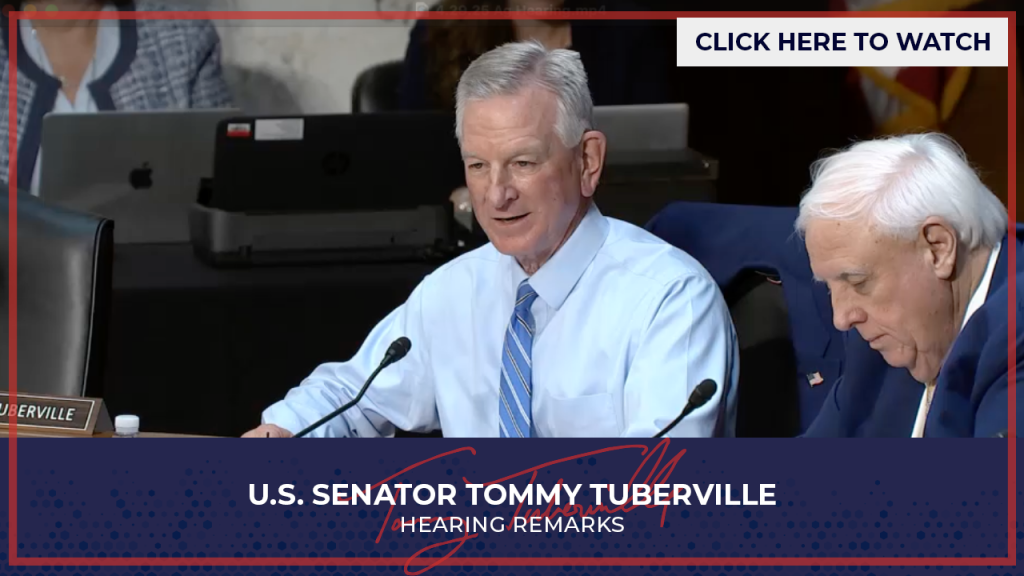WASHINGTON – U.S. Senator Tommy Tuberville (R-AL) joined a Senate Agriculture Committee hearing, to consider the nominations of Luke Lindberg to be Under Secretary for Trade and Foreign Agricultural Affairs, and of Devon Westhill to be Assistant Secretary of Agriculture for Civil Rights. During the hearing, Senator Tuberville and Mr. Lindberg discussed the significant impact foreign trade has on American farmers and producers. Additionally, Senator Tuberville and Mr. Westhill discussed protecting American agriculture and rural communities from woke, DEI policies.
Read excerpts below or watch the full clip on YouTube or Rumble.

ON PRESERVING AMERICAN FARMLAND
TUBERVILLE: “Thank you, Mr. Chairman. Gentlemen, thanks for being here. Five-alarm-fire. We’re in trouble.
The Ag Department and us, we have a big chore in front of us. We’re losing farmers every day. We lost 150,000 farms in the last four years […] It’s not acceptable. The Biden administration sat on their hands for four years, didn’t do one trade deal, and it looked like they tried to put our farmers out of business on purpose. […] I couldn’t believe it. Sat there watching it. We have got to do something. I get calls every week.
I get a call every week: ‘we’re going out of business.’ Worst the farmers have ever been. We can’t do business as usual. Something has got to be done. And if we don’t do that, we’re gonna lose them. It’s gonna be over and we’re gonna be buying every bit of the food that we eat out of this country. And we saw what happened during COVID. It was a disaster when we couldn’t get drugs because China’s only one making drugs. So, I’ll get off my soapbox here and thank both of you for what you’re gonna try to do.”
ON U.S.-FOREIGN TRADE DISADVANTAGES
TUBERVILLE: “Mr. Lindberg, cotton has weakened due to the surge of low value textile imports of synthetic fibers – all from Southeast Asia. And they come through an $800 de minimis loophole, and it’s killing us. So, President Trump’s been working to close this loophole. Can you talk a little bit about that?”
MR. LINDBERG: “Senator, thank you. I can, and I appreciate you spending some time with me in your office to discuss these issues prior to this. Enjoyed our conversation. Absolutely, President Trump has taken seriously—based on the news reports I’ve seen— the de minimis exemption which has been a tragedy for not only our cotton farmers, but also for manufacturers and a lot of other industries across America.
I will absolutely work alongside, and look forward to working alongside, our interagency colleagues to make sure that those de minimis exemptions and things are held accountable and are following the law of the land. Our former governor is now at the Department of Homeland Security and looking to work with her team at Customers and Border Protection as well […] Thank you.”
TUBERVILLE: “Well, you know, it sounds like a little thing, but all those little things add up for our farmers. And, you know, we have got to get better commodity prices. If we don’t, I mean, it’s gonna be over with for United States farmers.”
ON CIVIL RIGHTS
TUBERVILLE: “Mr. Westhill, how do you plan to approach and manage the USDA career staffers in the civil rights departments that do not support President Trump’s agenda?”
MR. WESTHILL: “Senator, I really appreciate the question. And I’ll say, look, I think the career staffers that I worked with in the first term were, many of them, consummate professionals. In fact, one of them is here today supporting my nomination as one of my guests. He served as the chief of staff the entire time that I served in the first term. I think the important thing to do is to you know, to put out a clear vision for what your plan is.
I think the vast majority of the individuals who are in that office want to actually enforce civil rights. That’s why they went into that office. And at the end of the day, it is a civil rights office. Not a DEI office. And I think that the vast majority of those individuals will get behind President Trump’s agenda, which is to advance civil rights.”
TUBERVILLE: “Team USA. I mean, the only way we can make [and] we can’t do it by pulling each other apart.”
ON CATTLE PRODUCTION
TUBERVILLE: “Mr. Lindberg, the Biden administration put U.S. cattle producers at a competitive disadvantage and endangered the American public by allowing imports of beef from Paraguay. That’s ridiculous. Paraguay cattle producers do not have the same food safety standards as [the] U.S. Can you speak to USDA’s plans to ensure sufficient due diligence is done in these inspections?”
MR. LINDBERG: “Sir, thank you for the question. For me, in my role at USDA, as the Under Secretary of Foreign Agricultural Affairs, and Trade, that will be an effort by my colleagues. But I look forward to working with my colleagues in making sure that they have timely market analysis and market intelligence on those exact issues.”
TUBERVILLE: “Thank you.”
ON PEANUT FARMERS
TUBERVILLE: “Also, our peanut growers in my state, which is huge, and across the country, have been at a competitive disadvantage in the marketplace due to non-tariff trade barriers on peanuts from aflatoxin in the European Union. I asked Mr. Vaden this when he came through a few weeks ago and I’ll ask you too. Would you commit to ensuring USDA and USTR work together on Trump’s agenda to reduce trade barriers and prioritize market access for all of our farmers?”
Mr. Lindberg: “I look forward to doing exactly that.”
TUBERVILLE: “Thank you. Thank you, Mr. Chairman.”
Senator Tommy Tuberville represents Alabama in the United States Senate and is a member of the Senate Armed Services, Agriculture, Veterans’ Affairs, HELP and Aging Committees.
###